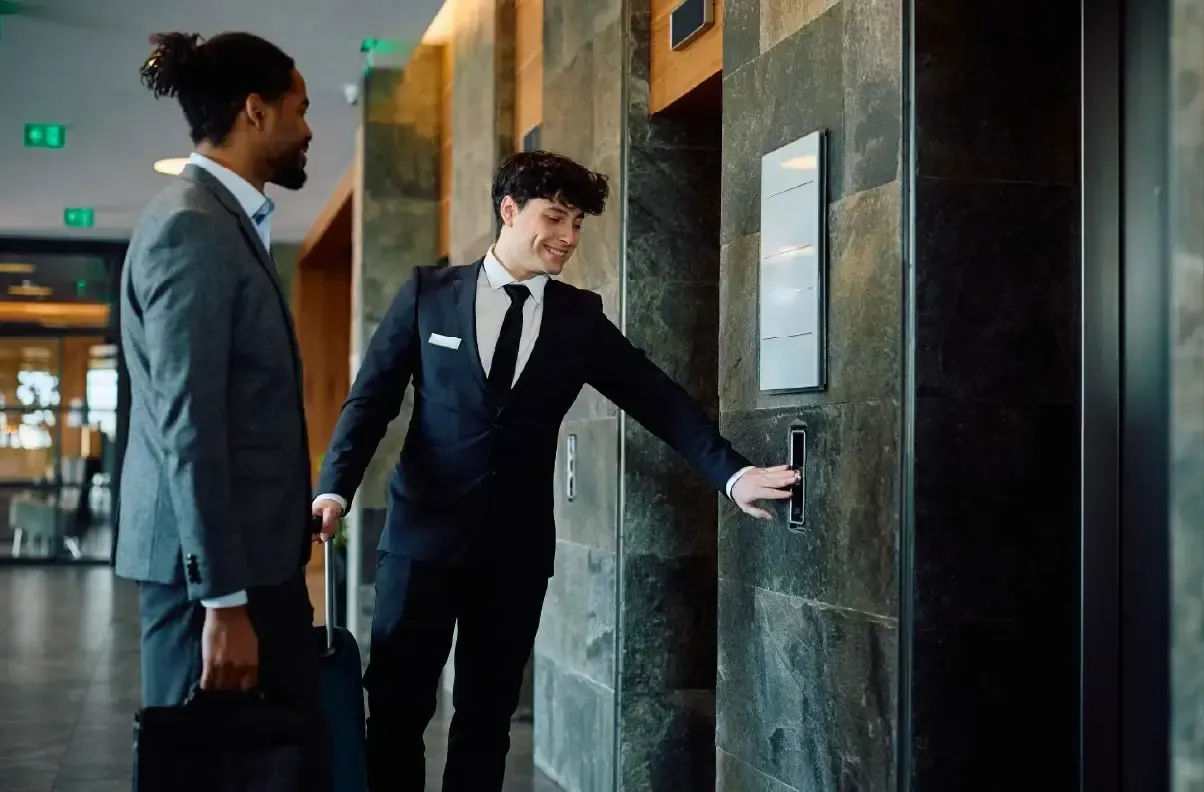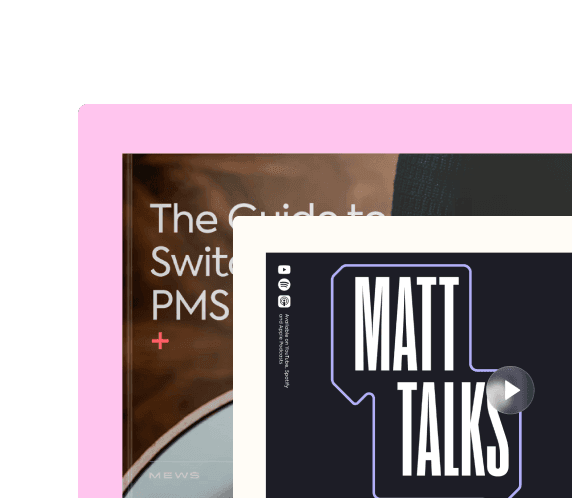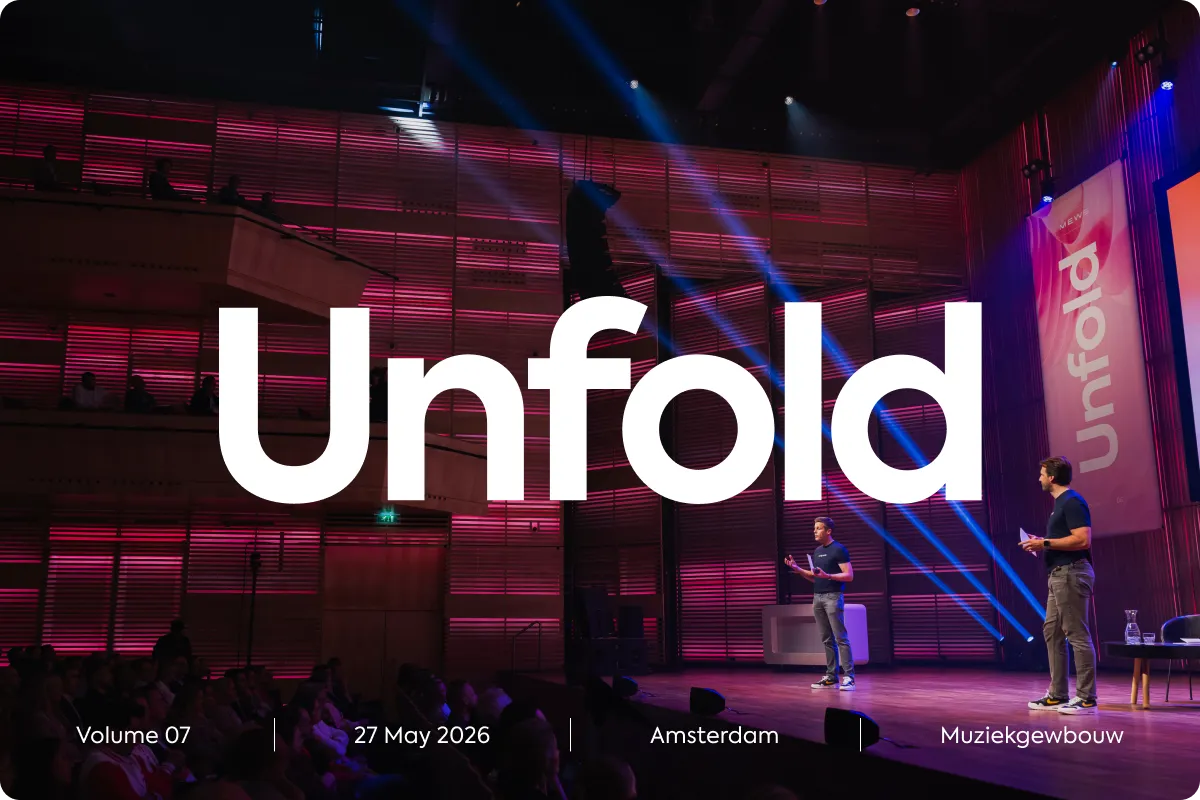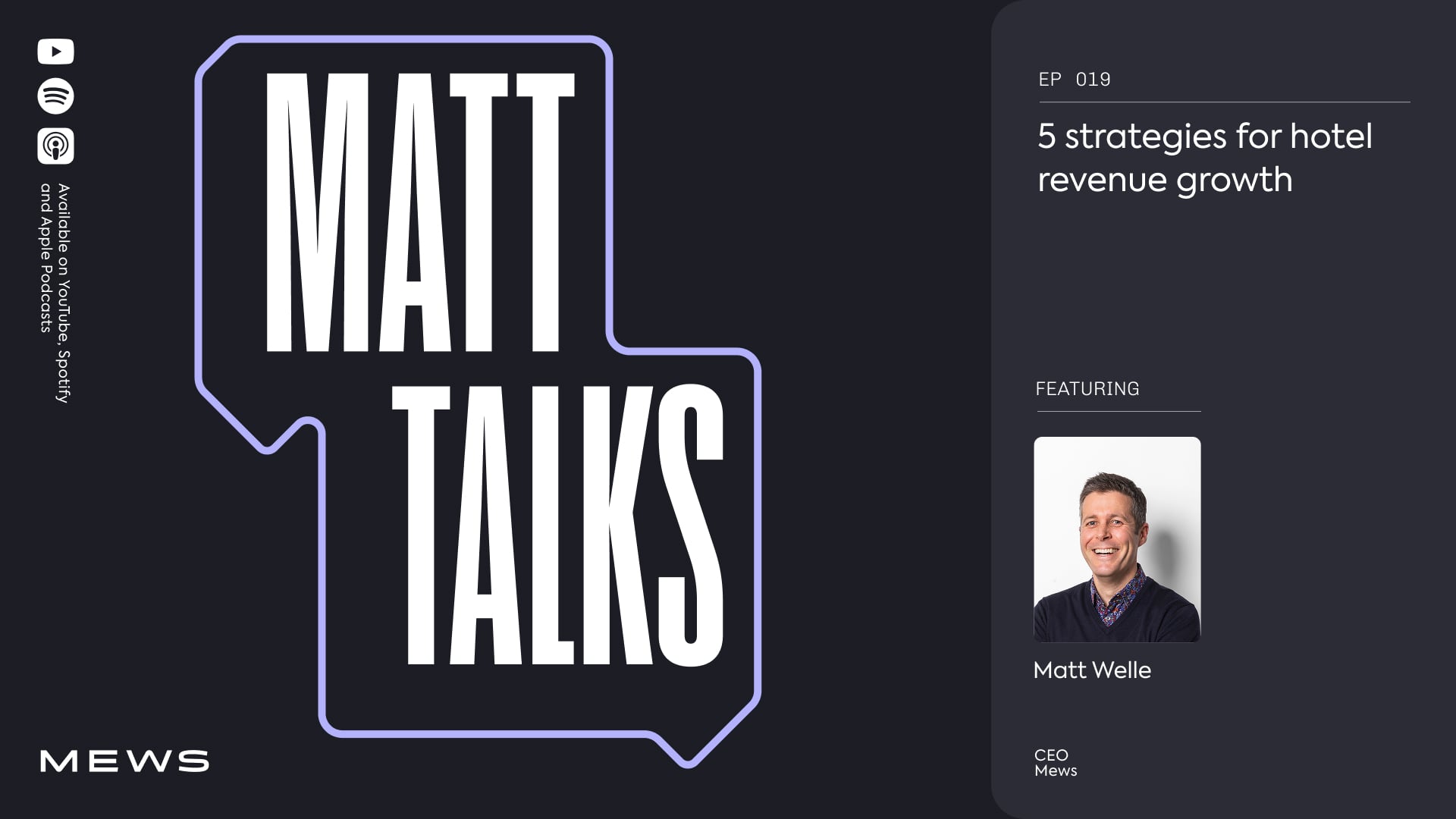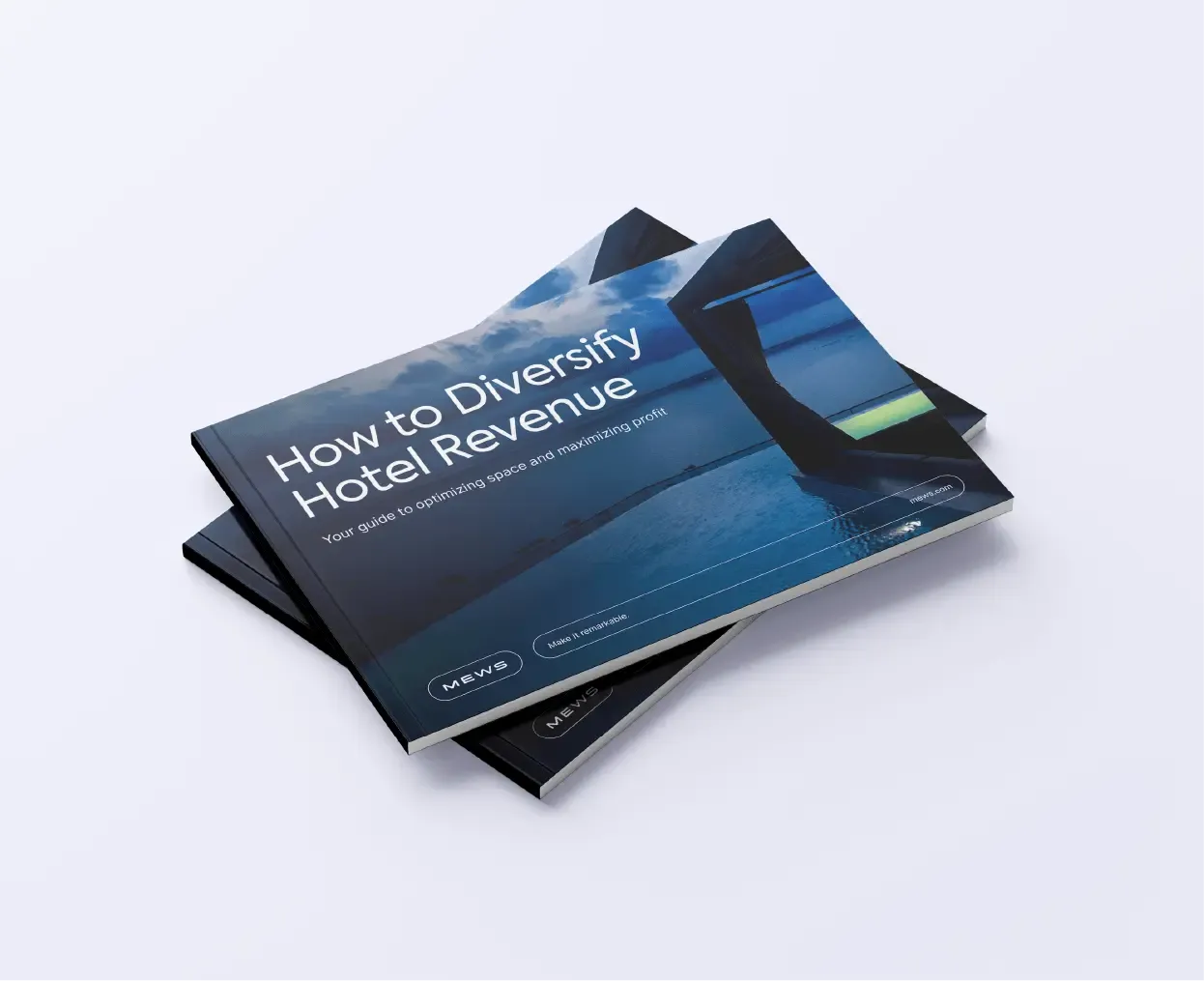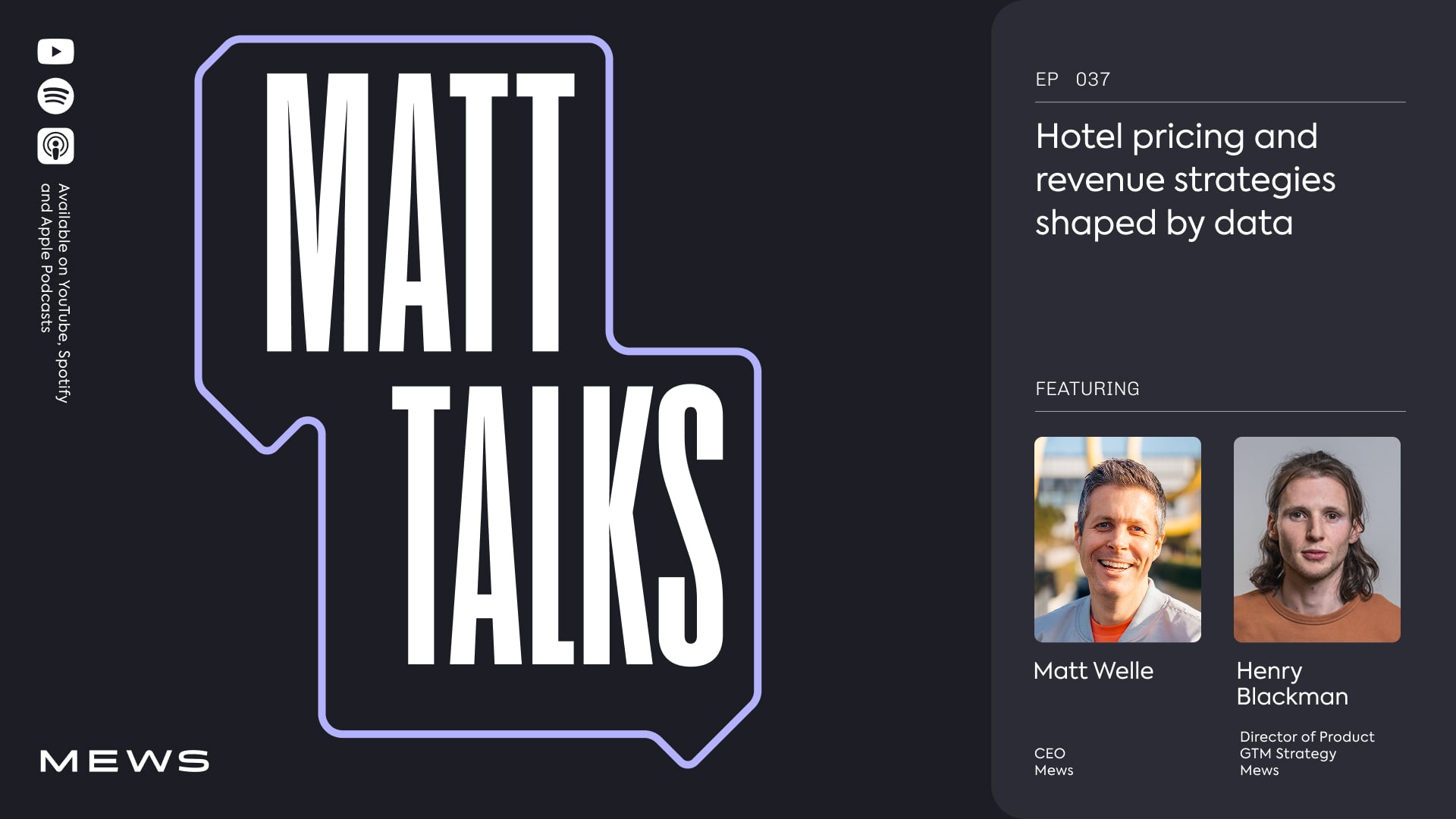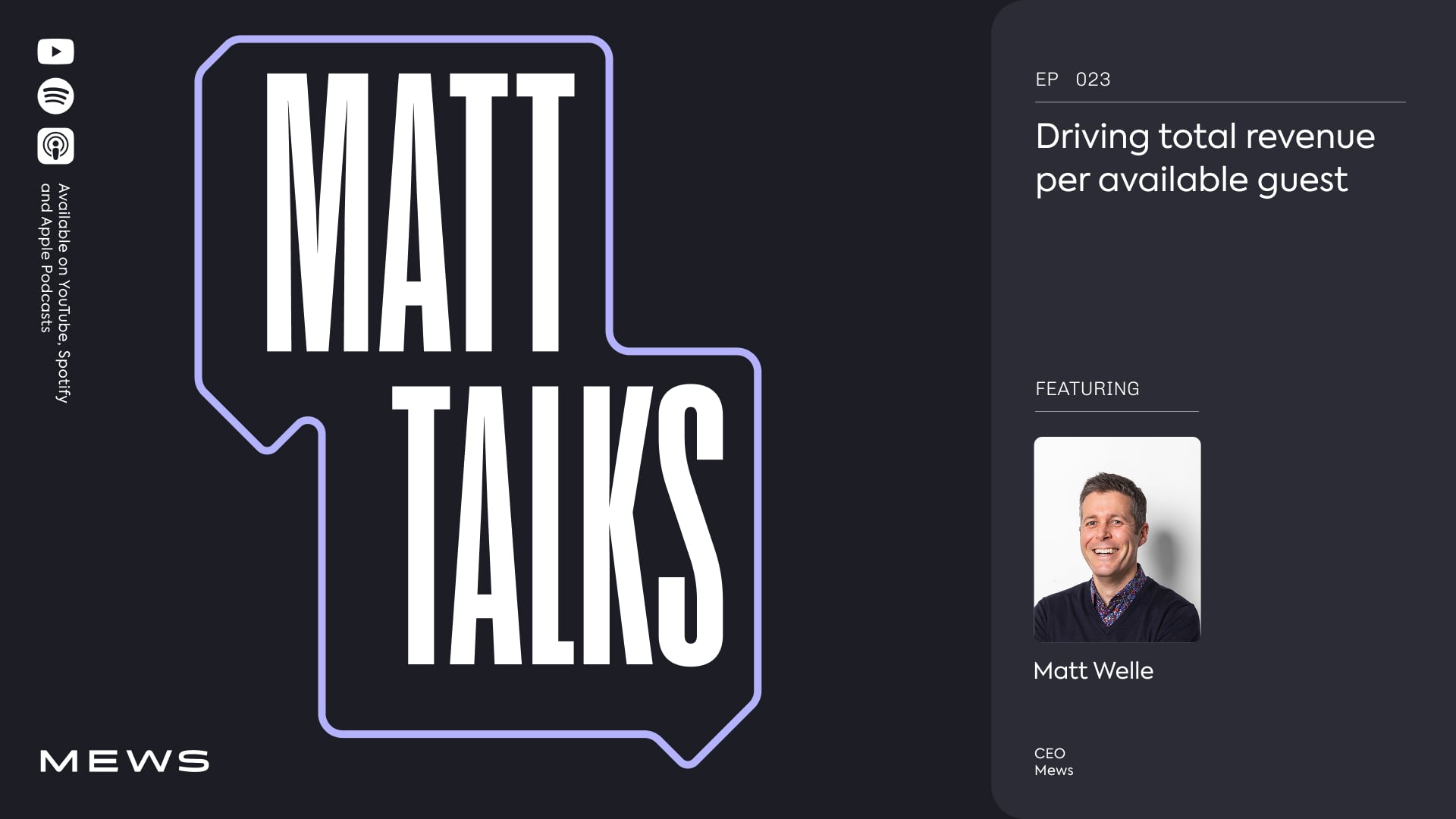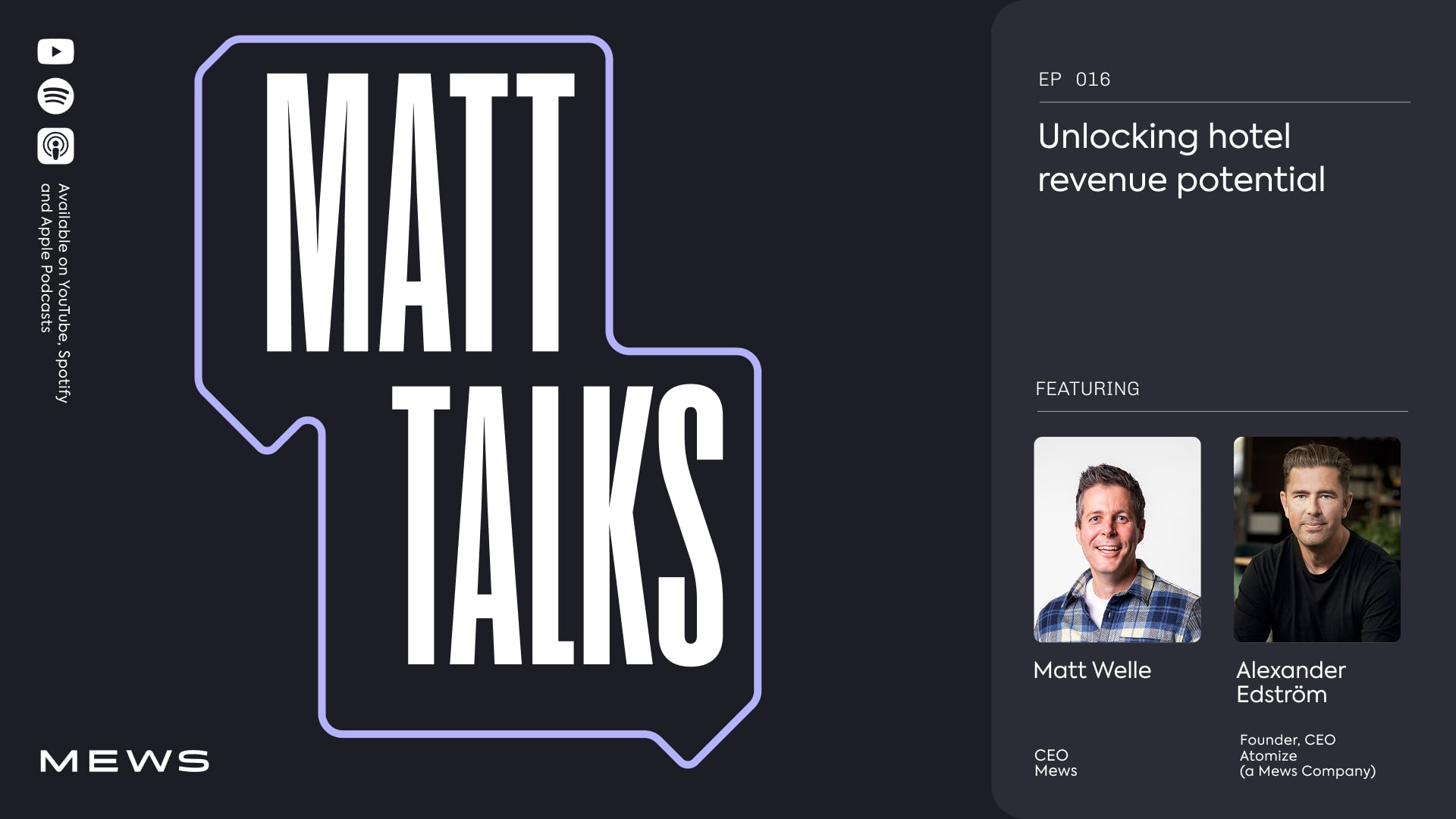What to expect?
Meet your host

Matthijs Welle
CEO, Mews
After years in the trenches of hospitality, Matt joined the Mews journey during its early days in 2013. Since then, he’s been our fearless CEO, leading the company and the industry forward.
Episode chapters
Transcript
Introduction to revenue strategies
Hi, everyone. Welcome back to Matt Talks. This week, I wanted to talk about revenue. How do we drive it and how do we improve it?
Because if you think about revenue and how it grows year on year, if you have a fixed hotel, a fixed structure with a fixed amount of rooms, it is very hard to to drive incremental revenue and do that every single year consistently. So you've gotta build a strategy because it's hard to drive occupancy up if you have a set limited set of rooms and if you don't use the right systems to do that. So you're not gonna see a significant drive in occupancy. So the upside has to come from driving the rates, and that's really hard.
Are there other ways to drive revenue? So on the one side, yes, there is more potential and more juice in the rates, But potentially we could look at the holistic view of the hotel. Maybe there are alternative services we could introduce. Maybe there's upselling to be done.
Maybe we should look at the payment side of it. So today, what I wanted to talk about is really how do we drive more revenue so that you don't just do an inflation correction. So if you look at inflation in Europe, for example, last year was two point four percent, I think.
Generally, you wanna correct for inflation, but there's also other costs and you wanna just make sure that you drive more money so that you can reinvest that money back into the hotel. So if you want to do more than that two point five percent year on year, it means you shouldn't run your hotel as you've done last year. That's the most important thing. Change is important and you have to constantly try out new things.
And I want to just give a few examples of how we could look at it. And one of the things we're introducing this year, Mews, is metrics to help you think beyond the traditional hospitality metrics. So traditionally, the only real metric that we look at that is like benchmarked across the industry is RevPar, revenue per available room. So all hotels submit every night, how much revenues are they made and how many rooms were occupied.
And then based on that, they calculate RevPar and they say in your comp set, you're doing X. And it is an important metric, right? Because it's the core metric of the most important thing, which is your bedrooms, because you're ultimately a hotel. But if you wanna drive more revenue, you can only squeeze so much out of the existing bedrooms that you have.
And you've got to think beyond that because if you're looking to drive a five to ten percent increase year on year, you have to find a way to do that because inflation won't get you there. And if your product doesn't change, you need to get really creative. So we're introducing new metrics and news in the next few months, which talk about value. Like how much value are you getting from your average customer?
Because maybe if you shift to a different segment customer, you're gonna see an increased spending of that customer because maybe a leisure customer is more likely to spend in your restaurant or maybe a business customer. You know, it depends on your destination and your hotel specifically. So we're starting to track revenue per guest, for example. Another one is really the guest experience, because if you have really high experience and you see a slight increase in your Google score or your TripAdvisor score has a tremendous impact on rates because customers look deeply at these scores and they judge whether they should book your hotel.
Chapter
Revenue per unit area
We're looking at the, revenue per unit area. So, you know, in Europe, we talk about square meters. In Europe in US, that's square feet. If you look at the total squares space that you have, how much revenue are you generating per square meter? And let's compare that to your comp set. And then we can show you whether you're actually doing really well because that's a really important metric in real estate.
Revenue per employee. Maybe you're looking to automate, and maybe we can drive more revenue per employee. And also how much time are your teams spending on tasks? And these five kind of core metrics, we will be giving access to to the hotels, and we'll start to drive benchmarks so we can tell you whether you're doing well or not.
And then we need to start looking at, how do we drive revenue, right? So if we're first if you're seeing that you're currently underperforming in your revenue metrics versus your benchmark, you should have a strategy. And the strategy, traditionally, has been mostly around, let's sell more rooms at a higher rate. That seems to have been the standard, and it's a good metric.
But it's really hard to do that every single year consecutively as your product ages.
So so what else could we do? So the first one is definitely optimization. And I'm gonna talk about that pillar. What can you do with the existing room inventory to drive higher average rate rates?
Because it's definitely where the biggest bang for your buck is going to come. The second one is diversification. Underutilized spaces are spaces that we could transform into something different. So maybe you could look at your meeting spaces that you could turn into co working spaces that might drive more revenue, for example.
The third thing I want to talk about is collection because revenue is not revenue until you've collected the money. And it is really important that you are not cash poor, that you really collect the money in advance and that you ensure that you capture a hundred percent of the revenue basically as cash. The fourth area I'll look at is enhancements. So once they have booked, are there other things we could sell them?
Chapter
The many upselling opportunities
Upsells, for example. And then the last area I'll look at is protection. So once these guests have consumed these stays, how do we make sure that there is no fraud, there's no chargebacks or money being taken back. Because again, that comes out of your revenue eventually, and we need to protect that.
So those are the five kind of key areas that in this Matt Talks, I'll be covering with different integrations on the marketplace, potentially that you could look at different solutions for upsells, and also really on, on the cash flow. How do we drive and help you capture the revenue into actual cash? Because that's really critical. And hopefully, if you take some of these strategies, we can drive an increase in revenue beyond your traditional inflation correction that we're seeing in major markets.
Because on the one side, if you wanna drive room revenue, it's hard. But maybe there are other significantly underutilized areas where we can squeeze one, two, three, four percentage points of revenue increase, which is really valuable to the bottom line of your business. I hope you enjoy this.
Chapter
Building the right team
Before we go into any of those five kind of strategies, I think it is important for you to decide who the right team is in your hotel to work with you on this. Because, obviously, driving an incremental change in revenue strategy requires more than one person to get on board because you're gonna have to implement strategies. And, generally, a strategy won't work unless you get buy in from the the the tastemakers, the people that people listen to, those people that have opinions and can also execute on those things. I would think you wanna get four or five people in a room that work across the hotel, that are proactive and that are open minded about change, and actually try and engage them in a conversation.
So before you start talking about strategy, ask them questions to understand how you think that you're doing as a, as a hotel. And the first question could be saying, if we did everything the same as we did last year, how much revenue are we losing? Like how much incremental revenue are we losing, do you think? And let's put a number on a piece of paper.
Another good question to ask this small group of people is what is our current revenue strategy? If you had to distill that to a small paragraph that describes what our current strategy is for the hotel for total revenue, what would it be? Do we know it? Another great question will be, how do you rate our current revenue strategy?
Like, give it a score. So you've just written down our revenue strategy. Do you think it's a good strategy or do you think it's a bad strategy? Make everyone write these things down independently before they share because it will be interesting for you to hear the different views in the room.
And we often do this with our leadership team at Mews, where we ask them to write down or score meetings or score strategies. And it's so interesting that some people will think it's a three, whereas others think the five out of five. And then that discussion saying, okay, well, you said it was a three. So what do you think is the weak part of the strategy?
Another thing to ask possibly is saying, if you knew that our competitors make a twenty ten to twenty percent Trevpar total revenue per available room or space. If they make a ten to twenty percent Trevpar increase, would we change something? If we knew that our competition was growing faster than we were, would that spark innovation? And then lastly, once you come up with a strategy, is our culture set up to drive the change?
It gets really, really important that this isn't just one person trying to drive this change. It has to come organization wide, and it is driven by the GM generally. Because if the GM doesn't get behind this strategy, it's really hard to drive a tremendous change. You might change one of the little pieces of it that's gonna drive an impact, but ultimately it needs to be the most important people that make decisions, but are also on the execution side.
And is our culture set up in the right way or do we need to change it to drive some of this change?
So I definitely recommend to start with this kind of open conversation and throw out a few of the open question and make them write it down. And then after the discussion saying, you said this, what does, what does it mean? Or you score us on this level. What do you think we should be doing better?
And you'll get a taste of whether actually you're on the right track and whether you've got the right talent in the room and maybe you're not. Maybe, maybe you find that that actually people don't have an opinion about our revenue strategy, and that is also worrying. And that also will lead to a conversation about what do we need talent wise in the room if we truly wanna drive an outsized revenue uplift versus our competition? Because ultimately, we all want to beat our competitors.
I do, as do you. And do you have the right team in place? It's one of the most important questions. And we ask this all the time at Mews.
We look saying we're about to have an incredible growth here again. Do we have the right team in house right now? Where do we think that our strategy will fail? And maybe we need to find different or better talent for those particular areas.
And talent management is really, really critical for driving execution of a very difficult strategy because everyone else in the market is trying to drive revenue. So it's really hard for you to step up and do better than them. And that's a talent game and a deep understanding of the business and having really bright people with really bright ideas in the room that can also execute on those ideas. Like just ideas alone won't get you there.
So this is just basically how you'd start that conversation.
Now I'd like to dig into what those kind of five areas are that I'd recommend you start to look at once you've got a sense from the room, whether there is an appetite to really try, try to drive this change.
So the first pillar that I wanted to look at is the optimization pillar saying, what are we currently selling, and can we optimize that any further?
And what are we currently selling is an important question because sometimes inventory is sitting in different systems. So the room inventory usually sits in the PMS, and then that links back to the RMS, the revenue management system. But the property management system is usually the core for where bedrooms are. However, if you are operating, for example, multi segmented business, if you're running both the short stays and long stays, sometimes long stays sit into a different system.
You wanna bring all of that into one system. Same for parking. If you're operating your parking in a standalone system, you wanna bring that back into the PMS so that you can link all of these different services, but but you don't have to log into because the more systems you have to log into, the harder it gets for you to manage the rates. And the smaller the revenue, the less likely it is you'll you'll do something with it.
Chapter
Best technology for revenue management
But those are the small one to two percent changes that you can really make that drive quite an impact. So try and migrate as much of the revenue and the price setting into one singular system. And with Mews, we have deployed selling per day, per hour, per night, per month, all into one system for all kinds of different spaces and objects. So you could even have your bicycle rental in there, your parking spaces, your co working spaces, your long stays that you could have in there if you have studio apartments, for example, that you rent for a minimum of a month.
All of that we've built into Mews so that revenue managers have a single source of truth. So that makes sure that you have one place to go to start looking at a revenue strategy.
And then really start thinking, okay, do we is this getting too complex to manage by hand? We're seeing that industry wide, over eighty percent of hotels don't have a revenue management system. They might have some pricing intelligence systems, like a lighthouse, for example, that helps give them some market insights, but they don't have, a revenue management system. And I do strongly recommend that you start looking at this because these systems are incredibly good today. AI has made such an increase in features in the last few years that it is completely valuable to implement this. Usually, an RMS will be a couple hundred euros for a midsize hotel. So that definitely will outweigh if they have an uplift of several thousands of euros every single month.
And I think that decision is a hard one because people have traditionally thought, actually, we can keep up. However, if all of your competitors are using RMSs and you are not, you're always on the back foot. And this is one of the biggest challenges with the speed at which things change. You need AI systems that work twenty fourseven.
So even if you're out for the weekend and something major happens, a major group gets booked on the website and suddenly there's this pickup, you wanna be able to respond very quickly. And this is just what an RMS does. We obviously acquired Atomize, a couple months ago because we thought it was the best revenue management system for our customer base that is deeply embedded within our system. So it deeply integrates and instantly can make changes the moment we see it start seeing a pickup.
However, we have some really great other revenue management systems in our marketplace that I would strongly recommend you look at as well. Also make sure that, you know, I'm not a big believer in occupancy based price changes because I think occupancy is only one dimension of, of, of a booking. So for example, if you see occupancy rising in your hotel, a lot of hotels will then instantly increase the rates as well. But occupancy rising in your hotel might just be a group that has booked, but the destination is not seeing this at pickup.
So if you suddenly increase your pricing, but all of your competitors are not, you are you're missing demand. And those last rooms that you do have available might not get sold until you lower your price back down to market level.
So I personally am not a big believer in occupancy based pricing for bedrooms.
However, if you think about parking spaces, the moment your hotel gets busier, your parking will naturally also get busier. And you could think about an occupancy based strategy for the pricing in your parking, because it's really hard to drive a five to ten percent increase on your bedrooms year on year. However, there are other services like parking where there's much less price elasticity because the guests will have booked your hotel. They need a space for their car. They're going to come anyway. And they might not mind paying five to ten euros extra for that parking space if the hotel is really fully occupied.
So this is where, an occupancy based strategy for parking spaces could actually have quite an interesting impact. One of the things we built in Mews, in the past few years was making everything dynamic.
Meaning not just the price of the bedroom is a dynamically priced commodity.
It's everything. So even the breakfast attached to the room can be dynamically priced. So you could say on a Saturday, breakfast is slightly more expensive than on a Tuesday, for example. Same for parking, same for bicycle rentals.
Anything that you have in Mews that has a price attached to it, we can help you dynamically price so that based on the day that it's being booked for, you can actually drive the revenue. Another thing is really making sure that you have your stay of length of stay restrictions properly set up. If you're trying to drive occupancy in the weekends, you need to look at driving length of stay to drive more of that leisure business rather than a one night stay that might not block the shoulder nights. And then you miss the ancillary revenue.
And this goes back to that metric I talked about earlier, which is how much are we spending totally on guests? Like how much are they spending across the hotel? That might be more important than your potentially nice RevPAR that you have for that one night. Actually, if overall these guests are spending more money at the hotel, but you are losing space on RevPAR against your competitor, it might not be a bad thing because they are in your hotel spending for more nights at the hotel.
What is also good is, you know, often hotels that do revenue management manually, they will look sixty days ahead. That is logically what you would do because you just cannot every single day look at it when the twelve to twenty four month period ahead. Whereas these revenue management systems are constantly evaluating when they see pickup in a period. They evaluate whether they should push the prices up.
And when you've got, for example, an Atomize integrated with Mews, and Mews integrates with a channel manager like a SiteMinder or Tubulus, the moment these prices come through, so in the weekends, you'll see a pickup in like seven months from today. Atomize will instantly adopt the prices and instantly that gets pushed out back to the distribution channel to make sure that there's no lag time. There's no waiting. And one example that we often give is what happened when Taylor Swift, for example, announced her concert tours.
And this is quite an extreme example, but you need to imagine that there's lots of micro examples like this that happen constantly, where you're missing a couple euros every time that you could have had a pickup. What happened is that Taylor Swift announced tour dates at, you know, midnight US time. So in Europe, we started seeing this massive pickup because people started booking first the tickets for the tour and then instantly started booking the hotels. I remember I did this for the Adele concert and I was able to trick the revenue management systems because I know how these things work.
So the moment we booked tickets, I instantly booked a hotel room and that room then became three times as expensive a week later. And what happens in a hotel is that these big pickups happen. On Monday morning at nine o'clock, the revenue manager walks in and is like, something happened over the weekend. I need to analyze this.
So they start to download the data into an Excel sheet. Then they got a run for the morning meeting. So you've now lost another hour. And then they go back to the desk and saying, yeah, there's this pickup.
I need to do something about it. And then they start crunching the data. It takes one to two hours. And then they start adjusting the price.
But it's already too late because the pickup has already happened. The demand was already there. You've probably already missed a significant gap. And this is where these revenue management systems make those incremental percentage points.
And it is so critical that you think about this in the right way. And lastly, an increase in revenue is not always an increase in the average price. And this is one of those things where everyone thinks we're just pushing pricing up, but maybe the strategy might be that you wanna drive occupancy. If you can drive occupancy by a five percentage point gain whilst the average price drops somewhat, you're bringing in more guests in the hotel.
And maybe those guests will bring more ancillary revenue. Or once they've booked, you can entice them to buy an upsell. So potentially, if you have a hotel where guests spend a lot of money, higher occupancy might be part of the strategy to drive. And I think that's really about thinking, right, do I want the best RevPAR, that number that everyone in the industry compares?
Or do I just look at my TrevPar or Trefpan? So total revenue per available room or total revenue per available square meter is even more interesting because then you really look at the real estate. And I think it is really important that you understand how much additional revenue your guests are bringing. So you then adopt your revenue strategy towards, for example, occupancy or potentially towards rates because maybe they don't spend in the hotel and the average rate actually matters significantly.
And that's really where your revenue management systems come in place and when you have a revenue management strategy to drive this. So this is the optimization pillar. Let's switch over to the next pillar.
Chapter
Diversifying revenue streams
The second pillar I wanted to talk about is diversification. One thing is selling the bedrooms that we have and just doing more of that. The other thing is thinking about the spaces more creatively, and making sure that you really map out everything that you have and maybe potentially add some more space or objects that you can already sell into the same system to drive more revenue.
So we added new spaces. So new spaces is basically anything that has gone beyond just bedrooms. So that could be, for example, long stays that, you know, those are apartments. We have coworking spaces and bicycle rentals and anything that you could think you could map in your hotel, we have enabled inside the system.
And also the way that Mews works is that it's not just per night, which is what a hotel charges by. We charge per hour, per day, per night, per month. Flexibility allows you to also sell these products on different websites, for example, to different target groups as well. And we've seen that out of our six thousand hotels, sixteen hundred hotels have already started mapping in these spaces.
And they've made about, three hundred million euros in additional revenue, out of which a hundred million is Longstays. Longstays is this new segment, which is driven by the hybrid travel world who are looking to stay longer times in a hotel. And that's driving significant revenue for hotels that have potentially some rooms that might have a kitchen or a place where you can stay longer. And it's driving real revenue changes.
One thing, you know, I did this great Matt Talks with the CEO of Mr. Green, which is a coworking space, but he was a hotelier before. And he talked about how at Penta hotels, he looked at some of their meeting rooms and he said, this meeting room is so depressing. When you go into these areas, like it is most of the time empty unless you have an event and you make good money when you have an event. But is it could you make more money or could you could you drive a change if you'd rethink that meeting room into a vibrant coffee spa co working space?
And potentially that could have been the case where you turn around that that that central space that you have as the the foyer and turn it into a really vibrant coworking space. And likely, those people will start to book meeting rooms as well if they're physically there, and that could drive much more higher occupancy of those meeting rooms. So potentially, that could be one of the things to look at. Are you utilizing your bedrooms for day use?
You know, this is, you know, we've got a great integration with dayuse dot com. So you could instantly launch your bedrooms for day use so that people who might just need a bedroom just, you know, if you're at an airport for the day or for a meeting that they just wanna book a, a private room. But day use really works. And it's just, you know, if it's just one or two bedrooms a day, it makes an incremental change that happens throughout the year.
Another great example is this hotel in Paris that have turned one of these dark basement rooms into a karaoke room. The basements, you can make noise. You've got rooms without windows, which are generally not revenue generating. But what if you put in, you know, decorate the room nicely.
You put some nice sofas in there, a karaoke machine. You make it bookable onto your website.
You could, for example, target customers through, an app like, an agent. So like a runner AI could message guests upon arrival saying, hey, we've got a great karaoke room. Would you like to book that with a link to the booking engine? And then as customers come into this karaoke booth, you can have the QR code. So for example, with Mews POS, you can have these QR codes so that people can order digitally. The way that you would order Uber Eats or Deliveroo, you can just scan a QR code in that room so you don't have to have a waiter around, but they can just order the drinks for their karaoke. And this is a great way to utilize a space that was previously not revenue generating and make it a really vibrant additional facility to the hotel.
And, you know, I can't judge whether you have these spaces in your hotels, but generally every single space you should drive more revenue from. If you think about the gym, the fitness, I I like to go to hotel gyms. I would love to order a protein shake. If you just have a QR code in the gym where I can order a protein shake once I get to the end of my workout, that's a really nice facility.
And it doesn't cost anything else. You already have a bar where you can start to make these, offer these services. You just have to connect the dots all the way through. And, and that's really thinking about every space you have, every product you currently have.
Do we sell it in the most optimized way? So the way that I described the example of the karaoke room, you could also think about your bicycle rentals. It's much more normal for a hotel to have a few bicycles for rent, and they just stand outside the hotel waiting for someone to come by. You could be proactive about that.
Right? We have a booking engine where you can book bicycles. You could target customers that have just arrived or are preparing to arrive and saying, Hey, would you like us to reserve a bike for you?
So rather than just having the facilities sit there and wait for someone to come to you, you should actually proactively have a strategy to drive more utilization of these diversified offerings that you have because every single bike, every single karaoke room booking that you have, every parking space that you can sell is incremental revenue. And that drives this total revenue per available square meter, for example, which is the most important metric for any hotel. So that's my diversify. So go beyond the bedrooms, diversify based on what you have today or what, you know, you could do with a space that you have today.
Maybe some of the spaces that you have are not making enough revenue. Could you turn those around? Could your meeting room rooms become co working space, for example? And it's really just thinking beyond the, the current real estate that you have and diversifying it.
Right. We talked about optimization of the existing rooms. We talked about diversifying the existing rooms into multiple spaces. The third area is enhancing, enhancements.
So what can we do above and beyond just selling the spaces that we have?
The most obvious is upsells. So if you have spaces and you're fully booked on the lowest category room, you should entice people to upgrade. And maybe the twenty euro fee is not getting the success. Maybe you should lower it to fifteen euros to make sure that you get these upsells.
And this is where, you know, Mews has great functionality for upsells during the online check-in. We do upsells during the kiosk check-in. But you can also turn to a specialized marketplace company. So for example, you could look at an Oaky and a Revinate who have great solutions for upsells as well, but you definitely need a strategy.
One of the things I often find is that hoteliers cannot imagine that because I remember when I I grew up in a hotel, I was like, I couldn't imagine someone buying an expensive suite. But now that I'm in a later stage of my life and I have more dispensable income, I actually would buy a nice suite with a nice room, a nice view, for example. So, it is really important that you have an upsell strategy. One, how do you do it systematically?
Through kiosks, through online arrival, through your CRM, there has to be a strategy. You need to have enticing products with enticing photos uploaded. But believe me, this works. This works incredibly well.
And then you have to have a strategy also for the human connection. So how do we use the humans that we have who are checking in, who are engaging with customers, and driving them to have those conversations. And with Mews, we deployed these AI tooltips on the profiles, recently. So we consume everything we know about the customer.
So we read all of their historic information, their profile notes, what they spent, and we give them back in a tooltip to the employees. And maybe those could be a really conversation starter. Maybe they could talk about the allergies or the things that they did last time and saying, last time you stayed in a suite, you know, would you like me to see that room is available for, you know, a discounted charge for you, for example? And upselling is really hard.
This needs to requires training. So it is really important that you think about how do I make my team members comfortable with doing this really difficult thing, which is upselling.
And upselling only really works when you understand your customer. You are able to engage them into a warm, personable conversation. And that's when you start to do the pitch. So if you understand why they're in town, often you can deduct from it.
If they're on leisure and, you know, they're in town for fun, or they're going to spend a lot of time at the hotel, you might entice them to take in a nice larger room, for example. But you have to make sure that you set your teams up for success around this. I have a separate Matt talks that talks about upsells and the kind of products that you could think about because I think a lot of hotels think we don't have anything to upsell. And I strongly disagree with this.
I think every single hotel has something to upsell. It just needs a little bit of creativity, and it does not require huge investments. And if you're a Mews customer today, we already have the features built in, but you do need configure them. You do need to set them up into the different flows of online check-in and the kiosk check-in.
So that's already there.
A new feature we're introducing is called, Mews multicurrency. So traditionally, if you're a traveler that's traveling to a country with a different currency, upon checkout, you're often being charged a currency conversion fee by your bank, and that fee is dependent on what your bank will charge. So we're now adding this option inside the checkout flow, where we say, would you like to pay in your own currency or in the hotel's currency? And this this really allows guests to pick the right currency that they want to pay in.
And that's another great way for a hotel to make a little bit of commission because we will take care of the conversion transaction rather than the bank where you don't know what the fee is going to be. And all of these little things, these upsells, these currency conversion things are all iterative one to two percentage points that add add up significantly throughout the year that come up to this larger kind of increase in revenue. Because if you're looking to drive anything over two, three, four percent, really looking towards ten and twenty percent, It needs a holistic approach to optimizing your rooms through revenue management system, diversifying your spaces to sell every square meter in your hotel, and then making sure that you get the upsell right.
So that if they booked something in a lower category, that you say, actually, we've got something greater available. So this really is a holistic strategy across different platforms, across different touch points with customers. And at every step of that way, it's a sales opportunity that we need to capture with your customers.
Chapter
Optimizing payment collection
Right. So we've talked about booking revenue. The next stage is collecting the money for that revenue because revenue is not revenue until you get payments for it. Otherwise, you cannot put it onto your profit and loss statements because someone who doesn't pay is not a customer, and that's a loss that you're making on the cost side of the business.
So the fourth area is really around collection. And this is why at Mews, we've deeply embedded payments into all of the workflows because we want to make sure that we help you collect money as fast and as early as possible and give you the tools that if you think you are missing out on revenue, that we allow you to capture some of that afterwards. So we have created these rate rules. So what happened traditionally in hotels, and I think a lot of hotels that are not running on news today might still do this, they they allow you to make a booking on the website.
They capture the credit card, and then they wait until the arrival or potentially no show. And And then they realize that the credit card doesn't work. And this happens a lot. And if you have, you know, five percent of no shows, those are rooms that's a perishable good.
Those are rooms you will not be able to sell again because a room not sold is a room loss. And it is so important that for a hundred percent of rooms, we capture it. And even if no show happens, that is very normal. But we have to ensure that within the cancellation conditions, you can capture the revenue and that the card is validated.
So one of the things we did is that as a credit card enters the system, we securely tokenized that card. We try and do a two factor authentication with that card so that if anything happens, we have really the safe details to charge. Then we recognize if that's a non refundable rate, we will instantly charge it. We will instantly send the receipt to the customer.
And that's a small thing, but it has a significant impact because when we send the receipt instantly, there's no suspicion from the customer. They made a booking and within seconds we've taken the payments that they see on their bank statement. So they can link the booking events to the payment events. And that creates the trust.
If it's a flexible rate, we will say maybe charge you the day before arrival and also add an pre authorization to fifty euros per night because this often happens on check-in. So let's try and automate as much of this as possible, removing the space for human mistakes because humans make mistakes, but the system shouldn't. And at every point, every touchpoint of the customer in the digital journey, but also in the physical journey, we've included payment opportunities. So the moment the guest arrives at the reception desk and you take payments from them on the payment terminal, like the Stripe terminals, we will ensure that not only will we take payments for that physical transaction there, we will also tokenize the card into the cloud so that if any late charges happen and you forget to take enough money from the card to begin with, you can do a late charge directly through the e commerce accounts of the hotel without having to contact the customer to say, please send us your credit card details because that's a really painful process.
Recently, we've also added payment links into invoices because often invoices go out and then you might wait a month, two months for payments and you start chasing it up. And collecting large invoices is one of the biggest risks to hotels. So we wanna make sure that we make payments for those invoices as easy as possible without any friction, without any manual human interaction where it could go wrong. Because what would traditionally happen is the invoice would go out with your bank details on it, and then the customer has to manually go into the bank and then remember, like copy paste all of the details across all space for human error.
Whereas if you have a payment link, it will automatically take payments and it will ensure that it's captured in the right way, that it's tracked in the right way, removing human error from that process. So we try and really help hotels think through how do we help you collect payments at every step of the way. Because payment is so critical to being able to report revenue onto your books as real revenue. And that's really the collection parts that I wanted to talk about.
Chapter
Transaction security and chargeback reduction
The last part that I wanted to talk about is protection.
So, not only should we capture payments, we also need to ensure that when the guest has departed and we've taken the payments, that those transactions are staying in your books because often you might get chargebacks.
So for example, the example I just gave where you make a booking and you instantly get a receipt, what happens in most hotels when you book a non refundable rate, you'll make the booking on a Saturday, Then you get a confirmation email and then your bank card is not charged until Monday or Tuesday because that's when the reservation department arrives back at the hotel. And then they start to transact these transactions. And the guest often does not recognize that that transaction from three days later links back to the, the reservation that they made over the weekend for the non refundable.
And that's where we see a lot of these chargebacks happening. And you want to really prevent chargebacks from happening because one, your money is gone, but there's also an additional fee that the bank raises for chargebacks. So we really think about the workflows. We instantly send receipts to customers.
So getting a receipt instantly as and when we charge your card shows in your inbox saying, hey, you probably have questions about what this transaction is. Here's the receipts of that transaction. And it matters significantly that we capture these things. We keep our chargebacks down, and we see that Mews has significantly lower chargebacks than a traditional kind of hotel running with these motel transactions where you're punching in credit card numbers on a terminal.
And that's really one of the most important risks that we try and help you with. We don't allow you to take unsecure payments. So no one in your hotel will ever see a credit card number. So the moment the credit card number is sent to us, we will make sure that it's routed through Secure Vault, and we have a button to charge the card, but no human will ever see that entire credit card, details.
So that if anyone would want to cause harm to your hotel and wants to steal some of this data, it is one hundred percent secure in our secure PCI vault so that you wouldn't be able to do anything significantly with that data. And that's a really critical piece to help you protect the revenue.
Chapter
How to optimize revenue
So that's that's basically the kind of core of all of it. So there's five pillars that we're looking at. So one is optimizing the existing rooms that you have for the most occupancy and the best rate mix. Second is looking at your real estate and diversifying your mix.
Then thirdly, we're looking at enhancing those spaces. So how do we upsell? How do we make sure that we get more revenue from the existing customer base that we have? And then the last two pillars really focus on capturing the money.
So let's automate as much as possible, no human mistakes to drive the collection of money so that revenue actually becomes real revenue. And then even after the revenue is posted, protecting it from fraud and from chargebacks at the end through the protection pillar. If you have a strategy like this in place, I think you're really set up for driving a ten to twenty percent increase year on year in your revenue if it's fully executed. And this is very difficult.
Everything I'm saying sounds probably really easy, but I realize that there's real work involved. There's real, rethinking of spaces, rethinking of workflows. But if you're, as a hotel, looking to drive an outsized increase year on year, you need a strategy and you need to execute on that strategy. And only the best hotels will drive those increases, and they will survive in a in a space where technology enables a lot, but it does require a strategy to drive the execution of this.
I hope you enjoy this. Thank you.



